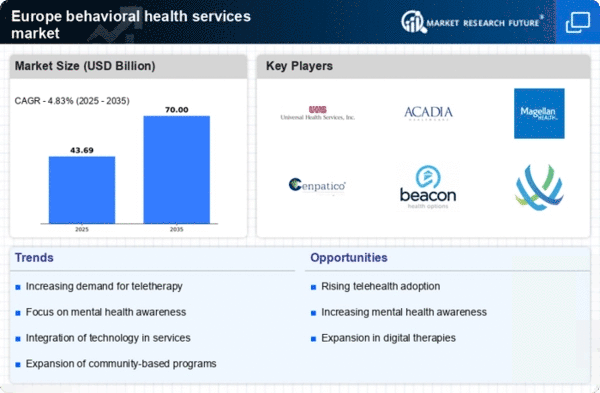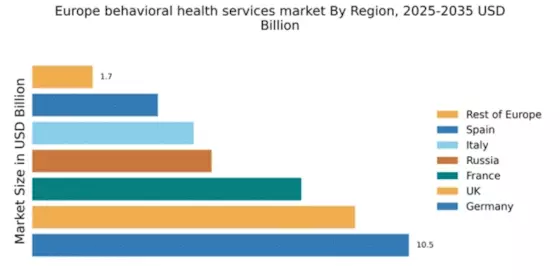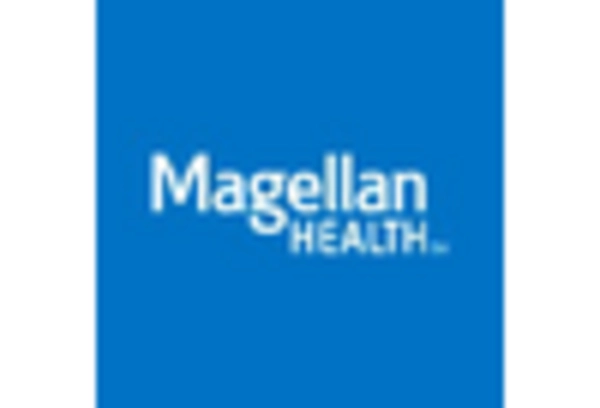Aging Population
The demographic shift towards an aging population in Europe is significantly impacting the behavioral health-services market. As the population ages, the prevalence of mental health disorders, such as dementia and depression, is expected to rise. Current estimates suggest that by 2030, approximately 20% of the European population will be over 65 years old, leading to an increased demand for specialized behavioral health services. This trend necessitates the development of tailored programs to address the unique needs of older adults. Consequently, the behavioral health-services market is likely to expand as healthcare providers adapt to these demographic changes. Additionally, the integration of geriatric mental health services into primary care settings may enhance accessibility and improve outcomes for this vulnerable population.
Rising Mental Health Awareness
The increasing awareness surrounding mental health issues is a pivotal driver in the behavioral health-services market. In Europe, campaigns aimed at destigmatizing mental health have gained traction, leading to a greater acceptance of seeking help. This cultural shift is reflected in the rising demand for mental health services, with a reported increase of 30% in service utilization over the past five years. As individuals become more informed about mental health conditions, the behavioral health-services market is likely to experience sustained growth. Furthermore, educational institutions and workplaces are increasingly prioritizing mental health, further contributing to the demand for services. This heightened awareness not only encourages individuals to seek treatment but also influences policymakers to allocate more resources towards mental health initiatives.
Increased Focus on Preventive Care
The shift towards preventive care in healthcare systems across Europe is emerging as a significant driver in the behavioral health-services market. There is a growing recognition that early intervention can mitigate the long-term impacts of mental health disorders. Consequently, healthcare providers are increasingly emphasizing preventive strategies, such as community-based programs and mental health screenings. Recent surveys indicate that approximately 40% of healthcare budgets are now allocated to preventive care initiatives, underscoring the importance of this approach. This focus on prevention not only aims to reduce the incidence of mental health issues but also seeks to alleviate the burden on healthcare systems. As preventive care becomes more integrated into health policies, the behavioral health-services market is expected to expand, fostering a healthier population.
Policy Support and Funding Initiatives
Government policies and funding initiatives play a crucial role in shaping the behavioral health-services market. In Europe, various countries are implementing policies aimed at enhancing mental health services, which include increased funding for public health programs. Recent data indicates that public spending on mental health services has risen by 15% over the last three years, reflecting a commitment to improving access and quality of care. Additionally, the European Union has introduced frameworks to support mental health initiatives, further bolstering the market. This policy support not only facilitates the expansion of existing services but also encourages the development of innovative programs tailored to diverse populations. As funding continues to grow, the behavioral health-services market is likely to see enhanced service delivery and improved mental health outcomes.
Technological Advancements in Treatment
Technological advancements are revolutionizing the behavioral health-services market, particularly in Europe. Innovations such as artificial intelligence and machine learning are being utilized to enhance diagnostic accuracy and treatment efficacy. For instance, predictive analytics can identify individuals at risk of developing mental health issues, allowing for early intervention. Moreover, the integration of mobile health applications has facilitated remote monitoring and support, making mental health services more accessible. The market for digital mental health solutions is projected to grow by 25% annually, indicating a robust demand for technology-driven services. As these advancements continue to evolve, the behavioral health-services market is poised to benefit from improved patient outcomes and increased efficiency in service delivery.
.png)
















